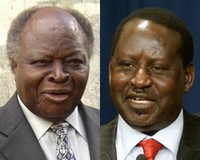It is almost a year since Kenya erupted into violence following contested presidential elections. Up until then, it had been considered a beacon of stability in a troubled region of Africa. That is the case no longer. In the aftermath of the violence have emerged accusations and counter-accusations as to who was ultimately responsible. Members of Parliament, the media, the police force and even local government administrations have all been implicated at some stage, as Kenyans have tried to make sense of a crisis that reflected simmering ethnic tensions, driven by deep social grievances. Following the successful implementation of a power-sharing government earlier this year, progress is finally being made on finding some real answers to these questions. In the fall of 2008, two major reports were submitted to the government -- the first from the Independent Review Commission (IRC), chaired by South Africa's Johan Kriegler; the second from the Waki Commission, headed by Kenyan High Court Judge Philip Waki.
Kenya on Trial

